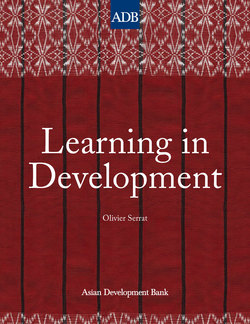Learning in Development

Реклама. ООО «ЛитРес», ИНН: 7719571260.
Оглавление
Olivier Serrat. Learning in Development
Learning in. Development
Contents
Abbreviations
Preamble
About the Author
Prelude
Introduction
The Changing Context
The New Modus Operandi
Evaluating Operations Performance
Directions in Evaluation
Influential Evaluations
Managing Knowledge
Conclusions
APPENDIX 1. Independent Evaluation at ADB: A Brief Account1. The Beginnings
Articulating the Operations Evaluation System
Creating New Evaluation Products and Services
Increasing Special Studies and Sector Syntheses
Developing Evaluation Capacity
Shortening the Feedback Loop
Promoting Quality at Entry
Ensuring Independence of Evaluation
Progressing to Full-Fledged Operations Evaluation
APPENDIX 2
APPENDIX 3
APPENDIX 4
APPENDIX 5
APPENDIX 6
Audit Committee Chairs
Development Effectiveness Committee Chairs
Prelude
Introduction
Knowledge Management in ADB
Learning Lessons. Value of Evaluations
Typology of Lessons
Informing Practice
Building Value
Reaching Out
Caveat
Facilitating Lesson Learning
Options for Lesson Learning
Auditing the Lessons Architecture
Business Planning
Putting It All Together: The Strategic Framework. Knowledge, Relationships, Context, and External Environment
Interfaces
Architecture
Operating Framework
Annual Business Planning
Resources
Next Steps
APPENDIX 1
APPENDIX 2
APPENDIX 3
What Is Knowledge?
Model of Learning Progression
Knowledge Agents
Modes of Knowledge Creation
Knowledge Management Levels
Knowledge Management Architecture
Leadership
Organization
Technology
Learning
Core Knowledge Activities
Knowledge Management Activities
Cultural Roadblocks to Knowledge Management Success
Psychological Factors
Social Factors
Assessing the Behavior-Performance Continuum
Early Pathways to Progress
Getting Results from Knowledge Management
Building Commitment
APPENDIX 4
APPENDIX 5
APPENDIX 6
APPENDIX 7
The Uses of Knowledge Auditing
Identifying Knowledge Needs
Drawing up a Knowledge Inventory
Identifying Knowledge Flows
Creating a Knowledge Map
Outputs of Knowledge Audits
APPENDIX 8
Prelude
Introduction
The Setting of Knowledge Audits. Learning Organizations
Organizational Learning
Organizational Culture
Learning for Change in ADB
Auditing Knowledge. Definition and Purpose
Deliverables
Constituents of Knowledge Audits
Auditing the Lessons Architecture
The Survey of Perceptions. Survey Definition
Survey Results
Associated Initiatives
Picking Investments in Knowledge Management
APPENDIX 1
APPENDIX 2
Interface with OED
Interface with ADB
Interface with the IEC
APPENDIX 3
I. Questionnaire for OED. A. Strategy Development
B. Management Techniques
C. Collaboration Mechanisms
D. Knowledge Sharing and Learning
E. Knowledge Capture and Storage
II. Questionnaire for ADB. A. Strategy Development
B. Collaboration Mechanisms
C. Knowledge Sharing and Learning
D. Knowledge Capture and Storage
III. Questionnaire for the IEC. A. Collaboration Mechanisms
B. Knowledge Sharing and Learning
C. Knowledge Capture and Storage
APPENDIX 4
APPENDIX 5
Prelude
Introduction
Learning in Organizations
Configurations of Organizations
Windows on Learning
Roadblocks to Learning
Dimensions of the Learning Organization
Building a Learning Organization. The Learning Organization Model
Organization
People
Knowledge
Technology
Overcoming Challenges to Learning for Change in ADB
Managing Critical Success Factors. Continuous Learning, People, and Clients
Learning Leaders
Human Resources Management for Learning. Celebrating Accomplishments
From Training to Learning59
Managing Talent Turnover
Creativity. Leveraging Enterprise
Opening Doors to Innovation
Organizational Design
Learning from Evaluation. Redirecting Division-of-Labor Approaches
Increasing Value Added from Independent Operations Evaluation
A Learning Charter for ADB
APPENDIXES
Dimensions of the Learning Organization
Seeking Feedback on Learning for Change1. Organization
People
Knowledge
Technology
A Declaration on Learning1. The Challenge
Assertions about the Nature of Learning
The Benefits of Effective Learning
For Society
For Organizations
For Individuals
What Certain Key Terms Should— and Should Not—Mean
The Signatories
Generating, Capturing, and Leveraging Intellectual Capital
Index
Отрывок из книги
Learning is the key to success—some would even say survival—in today’s organizations. The Asian Development Bank (ADB) must play a bigger part in putting the potential of knowledge solutions to work in the Asia and Pacific region. This means that ADB’s knowledge should be continuously enriched through both internal and external learning. For this to happen, ADB must become a more flexible and adaptable organization.
Learning in Development tells the story of independent evaluation in ADB, from its early years to the expansion of activities under a broader mandate; emphasizes the application of knowledge management to sense-making; and brings to light the contribution that knowledge audits can make to organizational learning. It identifies the 10 challenges that ADB must overcome to develop as a learning organization and specifies practicable next steps to conquer each.
.....
• ADB’s contributions to successful outcomes included a careful assessment of the capabilities of the executing agency, a flexible approach to project design and implementation, and regular project review.
Box 9: Characteristics of Successful Irrigation and Drainage Projects
.....